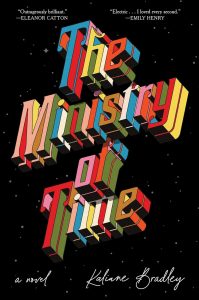Ian Mond Reviews The Ministry of Time by Kaliane Bradley
 The Ministry of Time, Kaliane Bradley (Avid Reader Press, 978-1-66804-514-5, $28.99, 352pp, hc) May 2024.
The Ministry of Time, Kaliane Bradley (Avid Reader Press, 978-1-66804-514-5, $28.99, 352pp, hc) May 2024.
As Gary Wolfe has long remarked – both in the pages of this magazine and on The Coode Street Podcast – time travel, one of the foundational pillars of science fiction, has been absorbed by the literary mainstream. Starting, arguably, with Audrey Niffenegger, both literary superstars (Kate Atkinson and Emily St. John Mandel) and emerging authors (Kate Mascarenhas, K Chess, John Elizabeth Stintzi, and Jinwoo Chong) have drawn on, and sometimes subverted, the established principles of time-travel. Mileage will undoubtedly vary, but I’ve been excited by how this infusion of “outside” talent, unburdened by the expectations of the genre, has added multiple fresh coats of paint to what had become a well-worn trope. I’m equally excited with two new debuts out this month from Kaliane Bradley and Frankie Barnet, who, in starkly different ways, use the genre’s conceits to interrogate our assumptions about race, class, and humanity’s long-term survival.
Kaliane Bradley’s The Ministry of Time is set in a near future where the UK government has stumbled across the ability to time-travel. Aiming to understand the effects of transtemporal displacement on the human body, the eponymous Ministry plucks five historical figures, all recorded as missing, presumed dead, from the time stream, resettling them in contemporary London. One of the five “expats” is First Lieutenant Graham Gore. If the name sounds familiar, it might be because you’ve read Dan Simmons’s The Terror or watched the TV adaptation (which is how Bradley first encountered the English officer), a fictional, supernatural-inflected account of the fated Franklin expedition to uncover the Northwest Passage. Each expat is assigned a “bridge,” someone who will live with them, monitor them, and ease their transition into our world. Gore’s bridge is a civil servant (she never tells us her name) employed as a Southeast Asian translator-consultant for the Ministry of Defence who is lured by triple the salary and the suggestion she will be working with refugees (her mother fled from Cambodia). Having accepted the role and signed all the requisite Top-Secret documents, our narrator is stunned to discover that her assignment isn’t a high-ranking asylum seeker but a handsome, “sweet-tempered,” temporally displaced Royal Navy officer.
This is the sort of novel you fall into, only to come up for breath to eat and sleep (though you may forgo the sleep). What makes it so immersive is the ease with which we accept Gore and the other expats, particularly Margaret Kemble (saved from the Great Plague of London) and Arthur Reginald-Smyth (whisked away from the Battle of the Somme). Bradley has put great effort into replicating period-appropriate speech patterns (they never sound like “ye olde” stereotypes) while carefully considering how each expat might react to 21st-century technology. Much of the humour and charm stems from these reactions, whether it be Gore enjoying the fact he has all the music he could ever want at his fingertips (he adores Motown) or Margaret falling deeply in love with cinema.
In fleshing out her cast, Gore, understandably, gets most of the focus, but I was more enamoured with Margaret and Arthur. Both are queer and express their sexuality differently. Margaret, who steals every scene she’s in, gets straight onto Instagram and Tinder, whereas Arthur, sweet and tender, the epitome of kindness, falls in love with Gore. Not that Arthur ever verbalises it. He knows it’s a love unrequited. While that does have an element of tragedy, Bradley doesn’t play it that way. Any sadness Arthur may experience is overwhelmed by the care, adoration, and respect each expat has for each other. Well, except for Cardingham. Taken from the 1645 Battle of Naseby, Cardingham seeks to reinforce his views on class, race, and gender by sadly embracing the toxic parts of our contemporary life.
As for our narrator, like Arthur, she also falls for Gore. The sexual tension is palpable, all the more so because Bradley allows the chemistry between the two to build before the tension inevitably pops. (My, does it pop!). But it’s more than just sex. The temporal gulf between the two allows Bradley to test their beliefs about race. A fraught conversation about Gore’s role on the Preventative Squadron – a nominally humanitarian attempt to stop the West African slave trade – forces the Lieutenant to question what happened to the 150,000 enslaved people they supposedly freed. (The majority died, often on the return voyage home). Our narrator, spurred on by Gore’s curiosity about her Cambodian heritage, comes to reflect on her identity and the trauma she subconsciously inherited from her mother. It leads to a remarkable passage where she internalises how lucky her mother was to escape the Killing Fields:
The most difficult stories about the Khmer Rouge are the ones over which hover almost and maybe. She almost made it, but dysentery took her at the end. He is maybe buried in the mass grave at Choeung Ek, so we will pay our respects there. He almost walked all the way to Thailand, but the cadres found him in the forest. She maybe saw her infant son one last time before he was taken.
Because so much air is given to the characters, the spy-thriller element, involving a time-travelling conspiracy at the heart of the Ministry, is left to the back third of the novel. It makes for a frenetic (possibly too frenetic) climax, with a neat “timey-wimey” wrinkle I should have seen coming but didn’t. In the end, though, The Ministry of Time is less about the paradoxes and changing the course of history and more about the differences and commonalities that bind us all across the breadth and length of time.
Ian Mond loves to talk about books. For eight years he co-hosted a book podcast, The Writer and the Critic, with Kirstyn McDermott. Recently he has revived his blog, The Hysterical Hamster, and is again posting mostly vulgar reviews on an eclectic range of literary and genre novels. You can also follow Ian on Twitter (@Mondyboy) or contact him at mondyboy74@gmail.com.
This review and more like it in the May 2024 issue of Locus.
 While you are here, please take a moment to support Locus with a one-time or recurring donation. We rely on reader donations to keep the magazine and site going, and would like to keep the site paywall free, but WE NEED YOUR FINANCIAL SUPPORT to continue quality coverage of the science fiction and fantasy field.
While you are here, please take a moment to support Locus with a one-time or recurring donation. We rely on reader donations to keep the magazine and site going, and would like to keep the site paywall free, but WE NEED YOUR FINANCIAL SUPPORT to continue quality coverage of the science fiction and fantasy field.
©Locus Magazine. Copyrighted material may not be republished without permission of LSFF.






